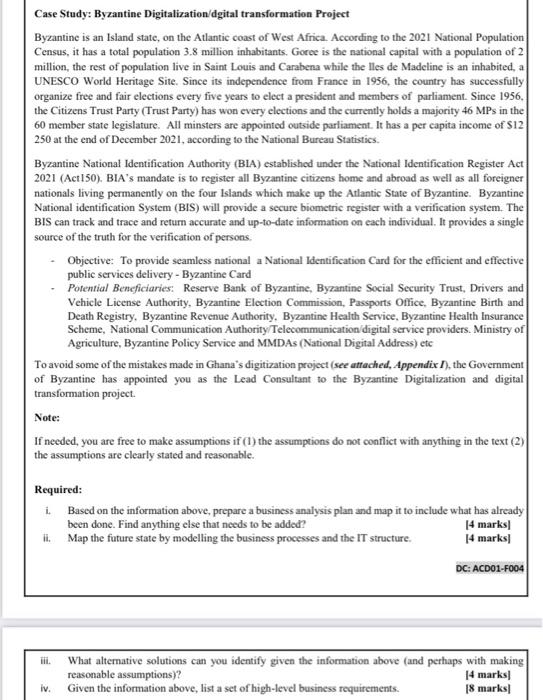Case Study: Byzantine Digitalization/dgital transformation Project Byzantine is an Island state, on the Atlantic coast of West Africa. According to the 2021 National Population Census, it has a total population 3.8 million inhabitants. Goree is the national capital with a population of 2 million, the rest of population live in Saint Louis and Carabena while the lles de Madeline is an inhabited, a UNESCO World Heritage Site. Since its independence from France in 1956, the country has successfully organize free and fair elections every five years to elect a president and members of parliament. Since 1956. the Citizens Trust Party (Trust Party) has won every elections and the currently holds a majority 46 MPs in the 60 member state legislature. All minsters are appointed outside parliament. It has a per capita income of $12 250 at the end of December 2021, according to the National Bureau Statistics. Byzantine National Identification Authority (BIA) established under the National Identification Register Act 2021 (Act150). BIA's mandate is to register all Byzantine citizens home and abroad as well as all foreigner nationals living permanently on the four Islands which make up the Atlantic State of Byzantine. Byzantine National identification System (BIS) will provide a secure biometric register with a verification system. The BIS can track and trace and return accurate and up-to-date information on each individual. It provides a single source of the truth for the verification of persons. Objective: To provide seamless national a National Identification Card for the efficient and effective public services delivery - Byzantine Card Potential Beneficiaries: Reserve Bank of Byzantine, Byzantine Social Security Trust, Drivers and Vehicle License Authority, Byzantine Election Commission, Passports Office, Byzantine Birth and Death Registry, Byzantine Revenue Authority, Byzantine Health Service, Byzantine Health Insurance Scheme, National Communication Authority/Telecommunication/digital service providers. Ministry of Agriculture, Byzantine Policy Service and MMDAS (National Digital Address) etc To avoid some of the mistakes made in Ghana's digitization project (see attached, Appendix I), the Government of Byzantine has appointed you as the Lead Consultant to the Byzantine Digitalization and digital transformation project. Note: If needed, you are free to make assumptions if (1) the assumptions do not conflict with anything in the text (2) the assumptions are clearly stated and reasonable. Required: i. Based on the information above, prepare a business analysis plan and map it to include what has already been done. Find anything else that needs to be added? ii. Map the future state by modelling the business processes and the IT structure. iv. (4 marks] [4 marks] DC: ACD01-F004 What alternative solutions can you identify given the information above (and perhaps with making reasonable assumptions)? [4 marks] Given the information above, list a set of high-level business requirements. [8 marks] Case Study: Byzantine Digitalization/dgital transformation Project Byzantine is an Island state, on the Atlantic coast of West Africa. According to the 2021 National Population Census, it has a total population 3.8 million inhabitants. Goree is the national capital with a population of 2 million, the rest of population live in Saint Louis and Carabena while the lles de Madeline is an inhabited, a UNESCO World Heritage Site. Since its independence from France in 1956, the country has successfully organize free and fair elections every five years to elect a president and members of parliament. Since 1956. the Citizens Trust Party (Trust Party) has won every elections and the currently holds a majority 46 MPs in the 60 member state legislature. All minsters are appointed outside parliament. It has a per capita income of $12 250 at the end of December 2021, according to the National Bureau Statistics. Byzantine National Identification Authority (BIA) established under the National Identification Register Act 2021 (Act150). BIA's mandate is to register all Byzantine citizens home and abroad as well as all foreigner nationals living permanently on the four Islands which make up the Atlantic State of Byzantine. Byzantine National identification System (BIS) will provide a secure biometric register with a verification system. The BIS can track and trace and return accurate and up-to-date information on each individual. It provides a single source of the truth for the verification of persons. Objective: To provide seamless national a National Identification Card for the efficient and effective public services delivery - Byzantine Card Potential Beneficiaries: Reserve Bank of Byzantine, Byzantine Social Security Trust, Drivers and Vehicle License Authority, Byzantine Election Commission, Passports Office, Byzantine Birth and Death Registry, Byzantine Revenue Authority, Byzantine Health Service, Byzantine Health Insurance Scheme, National Communication Authority/Telecommunication/digital service providers. Ministry of Agriculture, Byzantine Policy Service and MMDAS (National Digital Address) etc To avoid some of the mistakes made in Ghana's digitization project (see attached, Appendix I), the Government of Byzantine has appointed you as the Lead Consultant to the Byzantine Digitalization and digital transformation project. Note: If needed, you are free to make assumptions if (1) the assumptions do not conflict with anything in the text (2) the assumptions are clearly stated and reasonable. Required: i. Based on the information above, prepare a business analysis plan and map it to include what has already been done. Find anything else that needs to be added? ii. Map the future state by modelling the business processes and the IT structure. iv. (4 marks] [4 marks] DC: ACD01-F004 What alternative solutions can you identify given the information above (and perhaps with making reasonable assumptions)? [4 marks] Given the information above, list a set of high-level business requirements. [8 marks]







